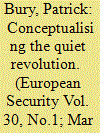| Srl | Item |
| 1 |
ID:
178616


|
|
|
|
|
| Summary/Abstract |
There is growing evidence that simultaneous to the Revolution in Military Affairs (RMA), a less obvious, but equally profound, Revolution in Military Logistics (RML) has occurred that shapes and underpins western military effectiveness. However, there has been no conceptualisation of this RML nor its wider effect on Western force structures. This article addresses this gap in the security literature. Using an interdisciplinary literature review and case studies, it makes two central contributions: first, it details how western military logistics systems and practises have transformed following post-Fordist principles in the last two decades. In doing so, second, it contributes a major new conceptual framework to the military logistics and security studies literature. Finally, the implications of these processes for military effectiveness are examined, with the conclusion asserting that the cumulative effect of this post-Fordist RML has potentially increased western militaries’ strategic vulnerability.
|
|
|
|
|
|
|
|
|
|
|
|
|
|
|
|
| 2 |
ID:
173750


|
|
|
|
|
| Summary/Abstract |
From an obscure sector synonymous with mercenaryism, the private military and security industry has grown to become a significant complementing instrument in military operations. This rise has brought with it a considerable attention. Researchers have examined the role of private military and security companies in international relations as well as the history of these companies, and, above all, the legal implications of their use in the place of military organizations. As research progresses, a significant gap has become clear. Only a handful of studies have addressed the complex of issues associated with contractors’ demographics and lived experience. This article sheds some light over this lacuna, examining contractors’ demographics using descriptive statistics from an original data set of American and British contractors who died in Iraq between the years 2003 and 2016. The article augments our understanding of an important population of post-Fordist-contracted workforce, those peripheral workers supplementing military activity in high-risk occupations with uncertain long-term outcomes.
|
|
|
|
|
|
|
|
|
|
|
|
|
|
|
|
| 3 |
ID:
121735


|
|
|
|
|
| Publication |
2013.
|
| Summary/Abstract |
In this article I examine the Korean Wave as an illustrative case of cultural globalization. I examine this new cultural phenomenon in light of the realignment of Korean media and cultural industries. The Korean Wave is a symptom of the discursive formation and practice of Korea's national cultural policy, which aims to advance Korea's global economic competitiveness by promoting innovation and expansion in the creative industries. I identify implications of the Korean Wave for critical theories of cultural globalization and for the Asian region in fostering or hindering regional cooperation and cultural diversity.
|
|
|
|
|
|
|
|
|
|
|
|
|
|
|
|